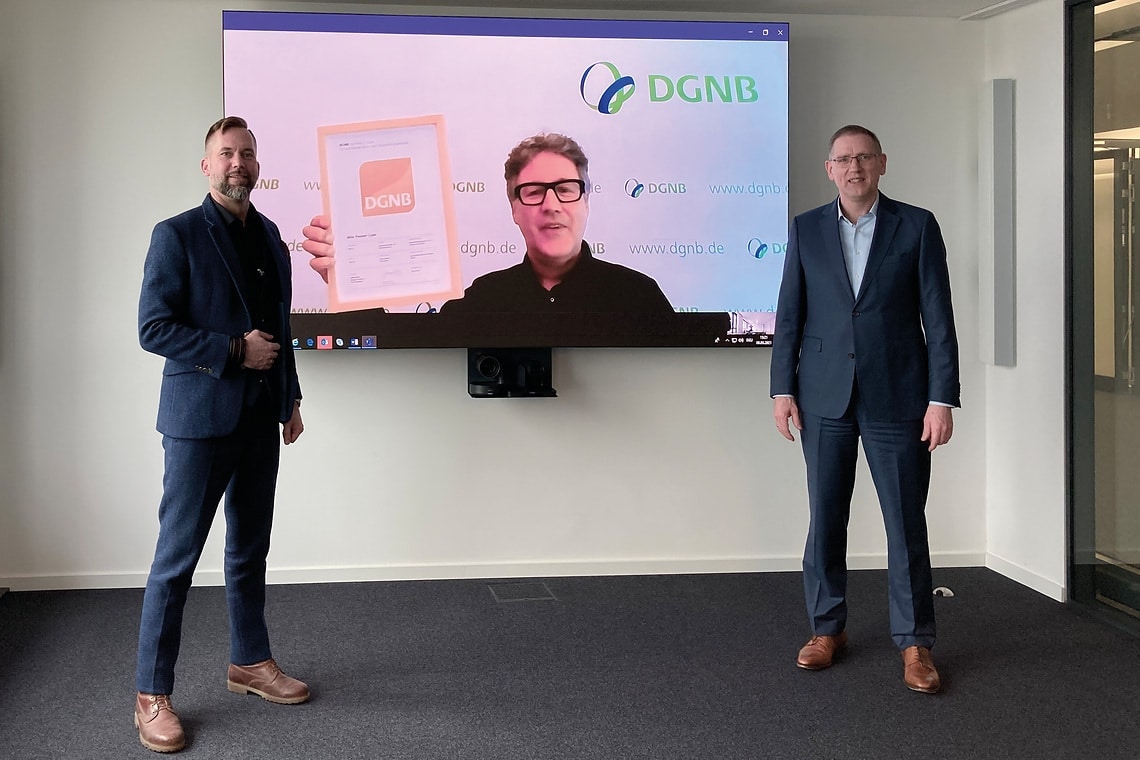16.03.2021
SUSTAINABLE MILESTONES AT THE NEWLY BUILT “WILOPARK” HEADQUARTERS IN DORTMUND
The Wilo Group is celebrating three sustainable milestones this week: The successful completion of the TüV certification as a “climate-neutral company in Dortmund”, the Leadership in Energy and Environmental Design (LEED) Gold certification award from the U.S. Green Building Council (USGBC) and the Gold certification of the German Sustainable Building Council (DGNB), both for the "Pioneer Cube" administration office building.
“We are delighted to receive these certifications, because for the Wilo Group, climate protection is not just part of the business model, but has always been an integral part of our DNA. We feel strongly that companies have an obligation to take on corporate political responsibility and to actively commit themselves to more sustainability and climate protection,” said Oliver Hermes, President and CEO of the Wilo Group.
Based on the company’s own “Ambition 2025”, Wilo has developed a holistic sustainability strategy that takes all stakeholders into account and is implemented across the whole Wilo-World.
“We have set ourselves the goal of producing climate-neutrally at all of our main production sites by 2025. What a great success to have already achieved this goal at the Dortmund location,” explains Georg Weber, Executive Board Member and CTO of the Wilo Group.

Virtual handover of the DGNB Gold certification on 09.03.2021 with (from left), Martin Linge-Boom, Group Vice President Corporate Real Estate Management, Johannes Kreißig, Executive Director of the DGNB and Georg Weber, Member of the Executive Board & CTO Wilo Group.
The TüV certification for climate neutrality is based on the balancing of the so-called Scope 1 and 2 emissions. Among others, Scope 1 includes direct CO2 emissions from the combustion of fossil fuels such as natural gas and heating oil. Scope 2, in turn, includes indirect CO2 emissions, e.g. from purchasing electricity. Wilo has been using green electricity for many years already. In addition, the photovoltaic system on the roof of the new Smart Factory contributes to the expansion of renewable energies. The remaining CO2 emissions of around 2,900t are compensated for by funding a Gold standard certified well project in Malawi.
In the course of awarding the LEED Gold certification, the U.S. Green Building Council rated the Wilo energy concept as particularly positive and highlighted how its annual energy consumption had successfully fallen 53 % below the consumption of the LEED reference buildings. In addition, the use of environmentally friendly and low-emission building materials was praised, which ensures the health of the building occupants through the guaranteed indoor air quality.
The DGNB also endorses the efficient energy concept of the Wilopark administration office building by awarding its DGNB Gold certification. “It was one of Wilo’s important concerns to develop the Wilopark in a particularly sustainable way. The high standards we set for our highly efficient pump systems are also set for our buildings. This should not only be a declaration of intent, but shall be visibly implemented”, emphasises Georg Weber.
“By receiving the DGNB Gold certification, Wilo is demonstrably showing that the company meets high requirements for holistic sustainability quality in its new building. After all, the DGNB system is considered the most advanced and ambitious of the various green building labels worldwide”, says Johannes Kreißig, Director of the DGNB Executive Board.
LEED Certification
Leadership in Energy and Environmental Design (LEED) is a system for classifying ecological construction that was developed by the U.S. Green Building Council in 1998. It is a certificate for sustainability that is used worldwide and defines a number of standards for environmentally friendly, resource-saving and sustainable construction.
The LEED® certification trademark is owned by the U.S. Green Building Council® and is used with permission.
DGNB Certification
Founded in 2007, the DGNB is now Europe's largest network for sustainable construction with around 1,300 member organisations. The goal of the association is to promote sustainability in the construction and real estate industry and to anchor it in the consciousness of the general public. With the DGNB certification system, the independent non-profit organisation has developed a design and optimisation tool for assessing sustainable buildings, interiors and neighbourhoods, which helps to increase real sustainability in construction projects. The DGNB system is based on a holistic understanding of sustainability which equally comprises environment, people and economic efficiency.